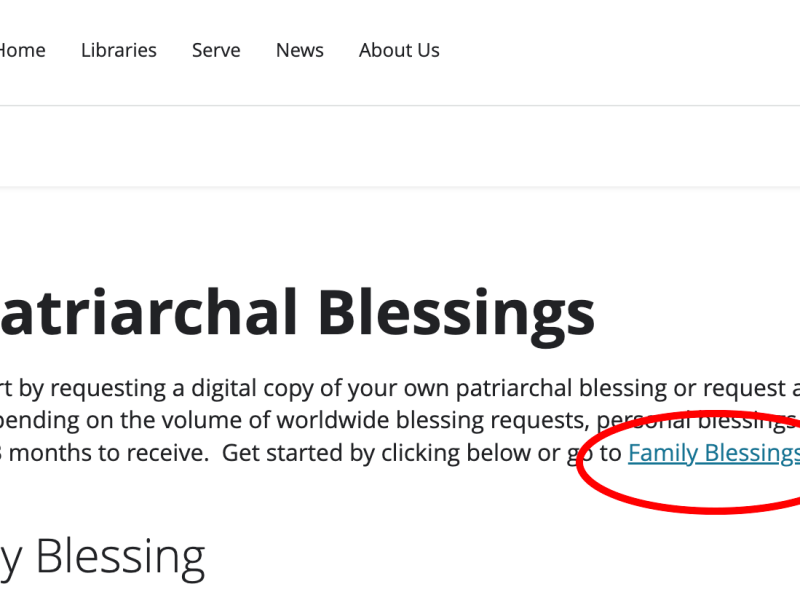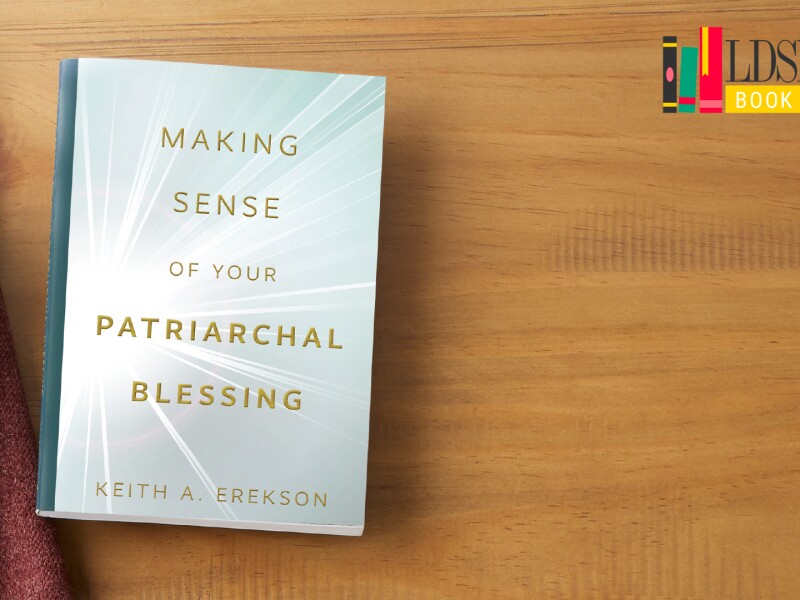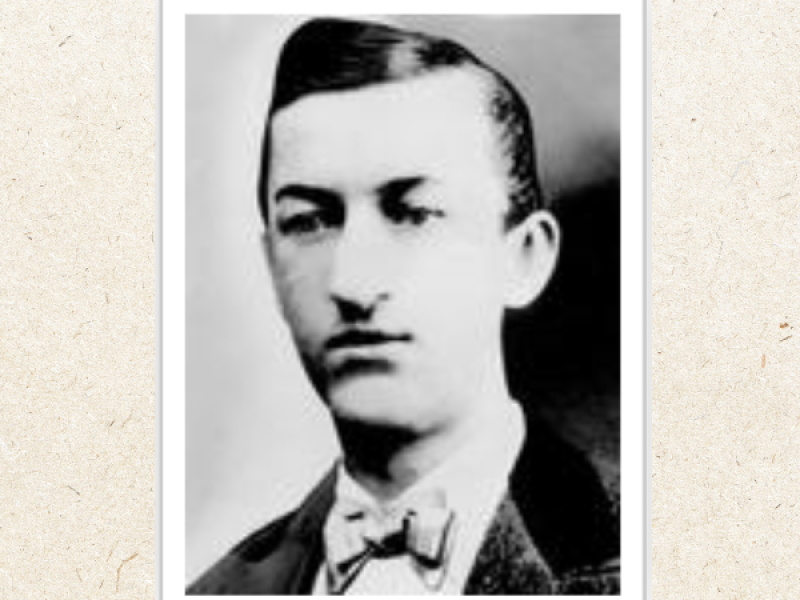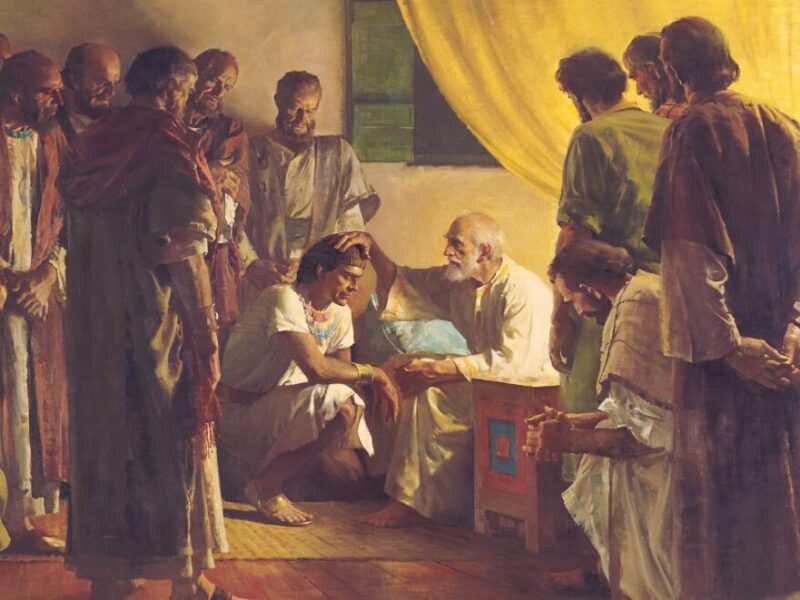The blessings given to deceased, direct-line family members are available to most users online, even without submitting a request. Here’s where you can find them.
1 Min Read
What do the promises in our patriarchal blessings mean? When will they be fulfilled?
1 Min Read
He grew concerned about his status in the Church, about the patriarch’s lack of inspiration, and about the truth of the Church itself.
6 Min Read
Do you have questions about patriarchal blessings? After writing a book on the topic, Keith Erekson might have some answers for you.
5 Min Read
“Some [patriarchs] may see the words ... and some may hear them. Others may just have impressions and feelings as to what they should say.”
6 Min Read
Here is President Ballard's advice for leveraging the power of patriarchal blessings in our lives.
2 Min Read
“I’m 96 years old—I’m too old!”
1 Min Read
If you expect your patriarchal blessing to make wild or unusual promises and predictions, you may be misunderstanding what a patriarchal blessing is. Your patriarchal blessing isn’t a fortune cookie, and the patriarch isn’t a fortuneteller.[1] The patriarch is a prophet, called to convey God’s words and will to you. He is only authorized to pronounce the promises he is prompted by the Holy Ghost to give. Patriarchs are counseled by their leaders to avoid making sensational or extravagant promises in the blessings they pronounce, even if the Spirit shows them rather remarkable things about the blessing’s recipient. President Joseph Fielding Smith (1876–1972), tenth President of the Church, explained, “I know of one or two cases … where a brother has been blessed by the patriarch and told that he would become a member of the Council of the Twelve [Apostles]. Usually [the patriarchs] don’t say that … even if the patriarch felt that the chances are [very good] that a man will be called to the leading councils of the Church.” President Smith added, “Patriarchs should be very careful in giving their blessings not to make extravagant expressions and to be conservative in what they say.”[2] Thus, you should not expect extravagant things to be mentioned in your blessing. Patriarchs generally avoid, for example, talking about things like the timing of the Second Coming when they give a blessing. While the young man or young woman being blessed may live to see the second coming of Christ, most patriarchs simply wouldn’t mention that in the blessing. President Smith further explained:
6 Min Read
I offer the following suggestions on benefits we may be missing from this wonderful personal counsel from God.
6 Min Read
Most patriarchs in The Church of Jesus Christ of Latter-day Saints don't own an ice ax, teach technical climbing classes, or summit world-famous mountains.
5 Min Read
Whether you're preparing to receive your patriarchal blessing or are looking for new perspective as you study yours, these resources offer wonderful suggestions and advice to help you navigate and understand the counsel God has for you.
2 Min Read
Elder Bruce R. McConkie of the Quorum of the Twelve Apostles wrote, “Nothing is more absolutely universal than the Resurrection.”[1] Though all people will be resurrected (1 Corinthians 15:22), not all will be resurrected at the same time. Technically speaking, there are four resurrections.
3 Min Read
Ephraim, Manasseh, Judah, Dan—there are 12 possible ways to become part of the house of Israel. Everyone baptized into the gospel belongs to one of these 12 tribes, but what does it mean if you don't belong to the same tribe as your family?
1 Min Read
One of my favorite games to play with my friends as a child was “MASH.” We would write out MASH (mansion, apartment, shack, house) at the top of any scrap of paper we had, then in between giggles we would come up with the names of our future husbands (usually whoever we had crushes on at the time), how many kids we could possibly have (from 1 to 1,000), what careers we might end up with (anything from artist to astronaut), and other “important” facts about our lives that would then be determined by a chance elimination based on a random number.
6 Min Read
Whether you're a member of the Church or not, anyone can create an account on lds.org and access its many resources. From tithing to family history to temples, there are lots of things you can do online with this account to keep you inspired and informed. Here are just a few.
4 Min Read
In our attempts to read our patriarchal blessing frequently to learn the counsel the Lord has for us, are we watching out for these five key things?
1 Min Read
“Your blessing is not to be folded neatly and tucked away. It is not to be framed or published. Rather, it is to be read. It is to be loved. It is to be followed. Your patriarchal blessing will see you through the darkest night. It will guide you through life’s dangers. … Your patriarchal blessing is to you a personal Liahona to chart your course and guide your way.” —President Monson
2 Min Read
Many members in the Church reach a point in their lives when they feel their experiences and the promises in their patriarchal blessing don't quite add up. Recently on Facebook Elder D. Todd Christofferson shared insights that can help us find hope and understanding in those situations.
1 Min Read
Aftervisiting Paris and Brusselsand creating the first stake in his home country, President Uchtdorf and his wife Harriet visited his childhood home in the Czech Republic.
1 Min Read
Just before the New Year, the Church announced two new online tools that will help Latter-day Saints across the world obtain, view, and share patriarchal blessings easier.
2 Min Read
MR says: What a good reminder of how we can review and receive more from this special, personal counsel from our Heavenly Father.
1 Min Read
In 1972, Elder Kimball visited California to reorganize the Pasadena stake. He called Jack McEwan as the stake’s new patriarch.
1 Min Read
In this Mormon Matters episode, we have the privilege of having a wonderfully fresh and engaging discussion with Richard Bushman, a well-known and distinguished historian who from 1989 until a few years ago also served as a stake patriarch. He, in interaction with podcast host Dan Wotherspoon and panelist Jared Anderson, generously offers his perspectives on just what patriarchal blessings are–and what they are not. In what way are they “prophecy”–and he does not back down from that term!–but also what are our responsibilities in working with all words of God, even prophecy (which, he is very adamant about, are all mediated by human minds)? How might someone re-frame what they see as a patriarchal blessing’s promise–such as being alive at the time of Christ’s return–that has “failed”? He also shares much about his own calling to be a patriarch and what the experience of giving patriarchal blessings is like for him. He explores his sense of what it means to declare someone’s “lineage” through one of the twelve tribes of Israel. Jared Anderson, in this section as well as an earlier framing of biblical precedents for patriarchal blessings and prophecies offers a wonderful reminder of the history of Israel and the “lost tribes,” along with fascinating insights into certain lines of argument in today’s biblical scholarship that both complicate and possibly free up for some people expectations about literal descent or what is going on when the Bible seems to contain passages that predict the future. Finally, the panelists discuss the idea of pre-existence in Mormon thought that often finds its way into patriarchal blessings through the words of some patriarchs who declare things about recipients’ “valiancy” during the War in Heaven or refer to some other aspect of pre-earth existence. If some people are declared to have been especially valiant, is the flip-side true that many others were not? Evil has often been done with such ideas, so this notion offers a good opportunity for an important wrestle–one that this discussion delivers.
1 Min Read
Manual 3; Supplement from "Special Experiences," by Ronald A. Rasband
1 Min Read




























